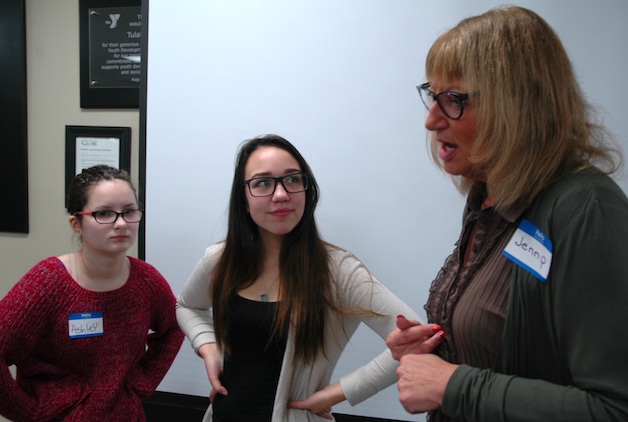MARYSVILLE — The Career Support Workshop for Girls at the Marysville Family YMCA’s Youth Development Center Jan. 30 went well beyond giving job advice to young women.
The event was co-hosted by Soroptimist International of Marysville and offered a lineup of speakers ranging from elected officials to contemporary peers of the school-age attendees.
Michi Smith, 18, is a Lake Stevens High School senior who learned at least as much from the event as she hopes others would gain from her insights, while Ivy Jacobsen, 20, shared the trauma that has inspired her to enter the police academy next year, when she’s finally eligible.
“My biological father raped me,” Jacobsen said. “I don’t let my past define me, and I don’t hide behind it. I’m a survivor, and I want to give victims a voice.”
Jacobsen said she was sexually abused for five years, from sixth grade through her sophomore year of high school. After testifying against her father and seeing him sent to prison, she’s since become a public speaker on domestic violence and women’s empowerment issues, in-between attending Everett Community College and holding down three jobs.
“I try to advocate on behalf of working women as well,” Jacobsen said. “What I hope girls learn is that they can use their challenges as opportunities. You can often find out what you’re most passionate about by facing obstacles.”
Smith likewise encouraged young women to stand up for themselves, whether in their personal lives or in choosing what to do after high school.
“Obstacles will always be there, so as cliche as it sounds, you need to be an advocate for yourself,” Smith said. “I’ve had teachers and guidance counselors who didn’t believe in me, but I never gave up on myself.”
The theme of valuing oneself was continued by Jenny Wieland, the prevention, education and community outreach coordinator for Domestic Violence Services of Snohomish County.
“I talk with kids who don’t know enough about healthy relationships to realize on their own that control is not love,” Wieland said. “When your boyfriend is sending you fifty texts at a time to see where you are, that’s not just checking up on you, that’s stalking you.”
Wieland spoke to the young women about the perils of social media, particularly how private aspects of relationships can all too easily be made public online.
“Even when you think a post or a photo is deleted, you should assume it isn’t really, and that a copy exists somewhere on the Internet,” Wieland said.
She added that a lack of specificity in state laws makes it possible for underage teens to be charged as sex offenders for creating or distributing what would be classified as child pornography, even if the children in question are themselves. She acknowledged that this could technically result in a young woman who poses for nude photos for her boyfriend being charged when that boyfriend shares those photos with others online.
“Twenty-five other states have separate laws that cover online coercion and harassment, and Washington needs the same,” Wieland said. “We’ve had kids get blackmailed, and even kill themselves, after two teens who were in a relationship broke up, and the one looks at the photos that the other sent, while they were still together, and says, ‘I know how to get back at you.’ Parents need to be talking with their teens about what they’re up to online.”


